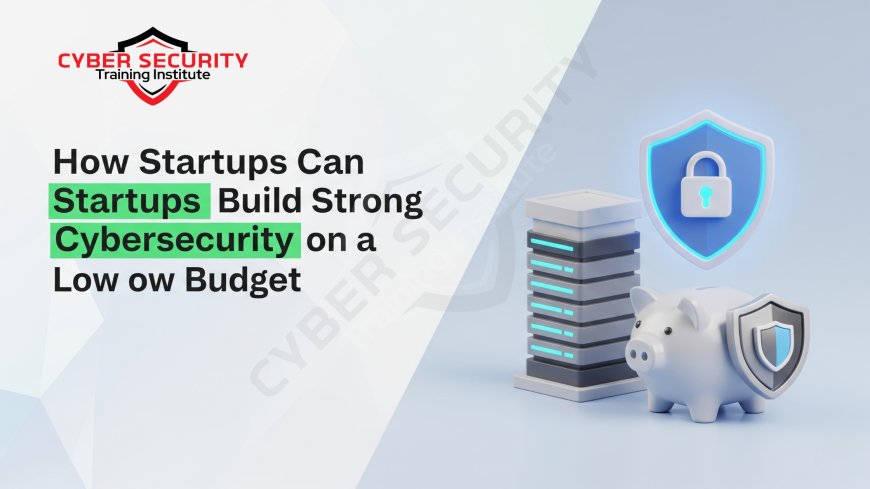How Startups Can Build Strong Cybersecurity on a Low Budget
In today's digital age, cybersecurity is no longer a luxury—it's a necessity for businesses of all sizes. However, for startups operating on tight budgets, investing heavily in cybersecurity solutions can seem like a daunting task. The good news is that building strong cybersecurity doesn't always require deep pockets. With a strategic approach and a focus on cost-effective measures, startups can significantly reduce their risk of cyberattacks and protect their valuable assets. This blog post will guide startups through practical and affordable strategies to establish a robust cybersecurity posture. We'll explore the essential aspects of protecting your business from online threats without breaking the bank. From fostering a security-conscious culture to leveraging free and low-cost tools, you'll learn how to build a strong defense that scales with your growth.

Understanding the Threat Landscape
Before diving into solutions, it's crucial to understand the types of threats startups face. Cybercriminals often target small businesses because they are perceived as having weaker security measures compared to larger corporations. Common threats include:
- Malware (viruses, worms, ransomware)
- Phishing and social engineering attacks
- Data breaches and leaks
- Denial-of-service (DoS) attacks
- Insider threats (intentional or unintentional)
- Website vulnerabilities
Understanding these threats will help you prioritize your security efforts and allocate your limited resources effectively.
Budget-Friendly Cybersecurity Strategies
Employee Training: Your First Line of Defense
Your employees are both your greatest asset and potentially your biggest vulnerability. Regular cybersecurity awareness training can significantly reduce the risk of human error leading to security breaches. Focus on topics like:
- Identifying phishing emails
- Creating strong, unique passwords
- Safe browsing habits
- Recognizing social engineering tactics
- Proper handling of sensitive information
Utilize free online resources, webinars, and create internal training sessions to educate your team.
Strong Passwords and Multi-Factor Authentication (MFA)
Implementing strong password policies and enabling MFA wherever possible are two of the most effective and low-cost security measures. Encourage employees to use complex passwords (a mix of uppercase and lowercase letters, numbers, and symbols) and avoid reusing passwords across different accounts. MFA adds an extra layer of security by requiring a second verification step (e.g., a code sent to a mobile device) in addition to a password.
Software Updates and Patching
Outdated software often contains security vulnerabilities that cybercriminals can exploit. Regularly updating your operating systems, applications, and web browsers is crucial for patching these weaknesses. Automate updates whenever possible to ensure timely application of security fixes.
Utilizing Free or Low-Cost Firewall and Antivirus Solutions
Most operating systems come with built-in firewalls, which can provide a basic level of network security. Ensure these are enabled and properly configured. For antivirus protection, several reputable free or low-cost options are available for both personal and business use. Research and choose a solution that fits your needs and budget.
Regular Data Backup and Recovery Plan
Data loss can be catastrophic for a startup. Implement a regular data backup strategy, ensuring that critical data is backed up frequently and stored securely in a separate location (preferably offsite or in the cloud). Develop and test a data recovery plan so you can quickly restore your operations in case of a data loss incident.
Implementing Access Control and the Principle of Least Privilege
Limit access to sensitive data and systems to only those employees who need it to perform their job duties. Implement role-based access control and adhere to the principle of least privilege, granting users only the minimum level of permissions necessary. Regularly review and update access rights as employees' roles change.
Website Security Basics (if applicable)
If your startup has a website, ensure basic security measures are in place:
- Use HTTPS to encrypt communication between your website and visitors.
- Regularly update your content management system (CMS) and plugins.
- Implement web application firewalls (WAFs) if budget allows (some cloud providers offer basic WAF features).
- Follow secure coding practices if you develop your website in-house.
Developing a Basic Incident Response Plan
Even with the best defenses, security incidents can still occur. Having a basic incident response plan in place will help you react quickly and effectively to minimize the damage. Your plan should outline steps for:
- Identifying and reporting security incidents
- Containing the incident
- Eradicating the threat
- Recovering affected systems and data
- Reviewing and improving your response
Building a Security-Awareness Culture
Cybersecurity should be a shared responsibility within your startup. Foster a culture where employees understand the importance of security and are encouraged to report suspicious activity. Regularly communicate security best practices and updates to your team.
Leveraging Free Security Tools and Resources
Numerous free security tools and resources are available to startups, including:
- Open-source security software
- Free vulnerability scanners (use with caution and understanding)
- Cybersecurity awareness training materials
- Government and industry resources on cybersecurity best practices
Research and explore these options to supplement your security efforts.
Building a Scalable Security Foundation
As your startup grows, your cybersecurity needs will evolve. While the initial focus may be on cost-effective measures, it's essential to build a foundation that can scale. This might involve gradually investing in more sophisticated security tools and services as your budget allows. Consider the following as you grow:
- Managed Security Service Providers (MSSPs) for specialized expertise
- Advanced threat detection and prevention systems
- Security information and event management (SIEM) solutions
- Regular security audits and penetration testing
Planning for scalability from the outset will ensure that your security posture can keep pace with your business growth.
Conclusion
Building strong cybersecurity on a low budget is achievable for startups. By prioritizing fundamental security practices, fostering a security-aware culture, and leveraging free or low-cost resources, you can significantly reduce your risk of cyber threats. Remember that cybersecurity is an ongoing process, not a one-time fix. Continuously assess your risks, educate your team, and adapt your security measures as your startup evolves. A proactive and budget-conscious approach to cybersecurity will protect your valuable assets and contribute to the long-term success of your business.
Frequently Asked Questions (FAQs)
Why is cybersecurity important for startups?
Startups often handle sensitive data, including customer information and intellectual property. A cyberattack can lead to financial losses, reputational damage, legal liabilities, and even business closure. Strong cybersecurity protects these valuable assets and ensures business continuity.
What are the most common cyber threats for startups?
Common threats include phishing attacks, malware infections (including ransomware), data breaches, and insider threats. Cybercriminals often target startups due to perceived weaker security measures.
How can I train my employees on cybersecurity without a big budget?
Utilize free online resources, webinars, and create internal training sessions. Focus on practical topics like identifying phishing emails, creating strong passwords, and safe browsing habits. Regular reminders and discussions can also reinforce security awareness.
What is multi-factor authentication (MFA) and why is it important?
MFA adds an extra layer of security by requiring a second verification step (e.g., a code from a mobile app) in addition to your password. This makes it much harder for unauthorized individuals to access your accounts, even if they have your password.
Are free antivirus software reliable?
Yes, many reputable free antivirus solutions offer good basic protection. However, consider the features and limitations compared to paid versions, especially as your business grows.
How often should I back up my data?
The frequency of backups depends on how often your data changes and how critical it is to your operations. For important data, daily backups are recommended. Consider automating the backup process.
Where should I store my backups?
Store backups in a separate location from your primary data. This could be an external hard drive, a secure offsite location, or a reputable cloud storage service. The key is to ensure that backups are not vulnerable to the same incidents that could affect your primary data.
What is the principle of least privilege?
The principle of least privilege means granting users only the minimum level of access necessary to perform their job duties. This limits the potential damage if an account is compromised.
How can I secure my startup's website on a budget?
Ensure you are using HTTPS, regularly update your CMS and plugins, consider a basic web application firewall (often available through cloud providers), and follow secure coding practices.
What should be included in an incident response plan?
Your plan should outline steps for identifying, reporting, containing, eradicating, and recovering from security incidents. It should also include procedures for communication and post-incident review.
How can I build a security-aware culture in my startup?
Regularly communicate about security best practices, provide training, encourage employees to ask questions and report suspicious activity, and lead by example.
Are there any free tools to check my website's security?
Yes, several free online tools can perform basic security scans for your website. However, be aware of their limitations and potential risks associated with using external tools.
When should a startup consider hiring a cybersecurity professional?
As your startup grows and handles more sensitive data, or if you lack in-house expertise, consider hiring a cybersecurity professional or engaging with a managed security service provider (MSSP).
What are the key security considerations when using cloud services?
Understand the security responsibilities shared between you and your cloud provider. Implement strong access controls, enable MFA, encrypt sensitive data, and regularly review your cloud configurations.
How can I stay updated on the latest cybersecurity threats?
Follow reputable cybersecurity news sources, blogs, and industry publications. Subscribe to security alerts from software vendors and government cybersecurity agencies.
What is ransomware, and how can I protect my startup from it?
Ransomware is a type of malware that encrypts your files and demands a ransom payment for their release. Protect yourself by having regular backups, keeping software updated, using antivirus software, and educating employees about avoiding suspicious links and attachments.
What should I do if my startup experiences a data breach?
Follow your incident response plan. This typically involves containing the breach, identifying the affected data, notifying relevant parties (customers, authorities), and taking steps to prevent future incidents.
Is cyber insurance necessary for startups?
Cyber insurance can help cover the costs associated with a data breach or other cyber incidents. While it's an added expense, it can provide financial protection and is worth considering based on your risk assessment and budget.
What are some low-cost ways to monitor my network for suspicious activity?
Utilize built-in operating system logging features and free network monitoring tools. Regularly review logs for unusual activity. Consider setting up alerts for critical events.
Where can startups find more information and resources on cybersecurity?
Explore resources from government cybersecurity agencies (e.g., CERT-In in India), industry organizations, and reputable cybersecurity websites and blogs.
What's Your Reaction?
 Like
0
Like
0
 Dislike
0
Dislike
0
 Love
0
Love
0
 Funny
0
Funny
0
 Angry
0
Angry
0
 Sad
0
Sad
0
 Wow
0
Wow
0















